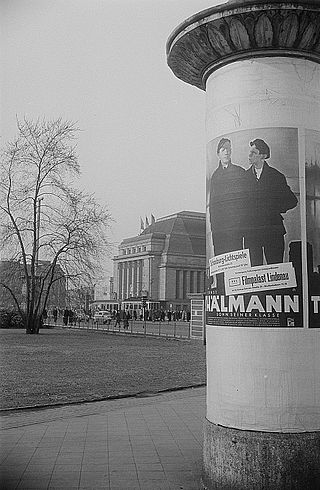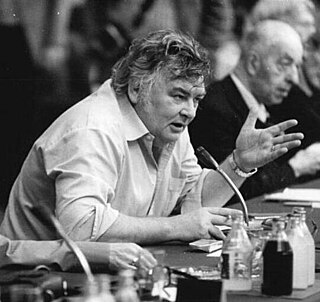Related Research Articles

DEFA was the state-owned film studio of the German Democratic Republic throughout the country's existence.

Frank Paul Beyer was a German film director. In East Germany he was one of the most important film directors, working for the state film monopoly DEFA and directed films that dealt mostly with the Nazi era and contemporary East Germany. His film Trace of Stones was banned for 20 years in 1966 by the ruling SED. His 1975 film Jacob the Liar was the only East German film ever nominated for an Academy Award. After the fall of the Berlin Wall in 1989 until his death he mostly directed television films.

Ernst Thälmann is an East German film in two parts about the life of Ernst Thälmann, leader of the Communist Party of Germany during much of the Weimar Republic, directed by Kurt Maetzig and starring Günther Simon in the title role. The first part, Ernst Thälmann - Sohn seiner Klasse, was released in 1954. It was followed by the 1955 sequel. Ernst Thälmann - Führer seiner Klasse.

Günther Simon was an East German actor.

Deutscher Fernsehfunk was the state television broadcaster in the German Democratic Republic from 1952 to 1991.
Trace of Stones is a 1966 East German film by Frank Beyer. It was based on the eponymous novel by Erik Neutsch and starred Manfred Krug in the main role. After its release, the film was shown only for a few days, before being shelved due to conflicts with the Socialist Unity Party, the ruling communist party in the German Democratic Republic. Only after 23 years was the film shown again, in November 1989.

Naked Among Wolves is a 1963 East German film directed by Frank Beyer and starring Erwin Geschonneck and Armin Mueller-Stahl. The film is based on author Bruno Apitz's 1958 novel by the same name. The film was remade in 2015 under the direction of Philipp Kadelbach.

Hannjo Hasse was an East German actor.

Erik Neutsch was one of the most successful writers in East Germany.

Walter Janka was a German communist, political activist and writer who became a publisher.
Rolf Henrich is a writer and lawyer. In September 1989 he became a co-founder and leading member of the New Forum movement.
Hermann Weber was a German historian and political scientist. He has been described as "the man who knew everything about the German Democratic Republic".
Michael Schumann was a German philosophy professor who became an East German advocate for reform and a politician during the build-up to German reunification. He is widely seen as a pioneer of the Party of Democratic Socialism which superseded the Socialist Unity Party in the German Democratic Republic in 1989/90.

Dirk Kummer is a German actor, director, and screenwriter. He is best known for directing movies Sugar Sand (2017), Wohin mit den Witwen (1999) and Rosenzweig's Freedom (1998).

Horst Pehnert was an East German journalist and party official who in 1976 became a long-standing deputy Minister for Culture - effectively the minister for film and cinema.

Mathilde Danegger was an Austrian stage and movie actress. Sources may also identify her by the pseudonym, Mathilde Leusch; Leusch is apparently a variant of her second husband's surname (Lesch).
Jutta Braband is a former German politician. In the German Democratic Republic she was a civil rights activist who after 1990 became a PDS member of the Germany parliament (Bundestag). Her parliamentary career ended in May 1992 after it had become known that fifteen years earlier she had worked for the Ministry for State Security (Stasi) as a registered informant .
Manfred Richter is a German writer, scriptwriter and dramaturg.

Michael Tschesno-Hell was a screenwriter and cultural official of the Deutsche Demokratische Republik.
Hans Oliva-Hagen was a journalist, writer, and screenwriter in the German Democratic Republic who wrote under the pseudonyms Hans Oliva and John Ryder. His most important works include his collaboration on the scripts for the DEFA film Carbide and Sorrel (1963) and the five-part GDR television film Conscience in Riot (1961). An anti-fascist militant and Holocaust survivor of Jewish heritage, Oliva-Hagen was active in the German resistance to Nazism.
References
- 1 2 3 "Biography: Herwig Kipping". (East) German Cinema and Beyond since 1993. DEFA Film Library, Amherst MA. Retrieved 20 March 2015.
- 1 2 3 4 5 6 7 8 9 Ines Walk (May 2006). "Herwig Kipping". DEFA-Stiftung, Berlin. Retrieved 20 March 2015.
- 1 2 3 4 5 6 7 8 9 Elke Schieber; Ingrid Kirschey-Feix. "Kipping, Herwig *31.3.1948 Filmregisseur, Drehbuchautor, Zensuropfer" (in German). Bundesstiftung zur Aufarbeitung der SED-Diktatur: Biographische Datenbanken. Retrieved 20 March 2015.
- 1 2 3 4 5 6 7 Erika Richter (interviewer); Rolf Richter (interviewer); Herwig Kipping (interviewee); Delene White (translator into English) (1991). "An Act of Love: A Conversation with Herwig Kipping" (PDF). Interview transcript. DEFA Film Library, Amherst MA (originally published in German in Film und Fernsehen in 1991). Retrieved 20 March 2015.
{{cite web}}:|author1=has generic name (help) - ↑ "Rückfall in die Barbarei: Ost- und Westintellektuelle verstehen einander weniger denn je. Besonders in..." Der Spiegel (online). 24 June 1996. Retrieved 20 March 2015.
- ↑ "Bildschirm aktuell". "Karl Stülpner oder Der Traum vom Fliegen" (1983). Neues Deutschland (online archive). 27 February 1984. Retrieved 20 March 2015.
- ↑ "antisozialistischer Tätigkeit auf einer oppositionellen Plattform"
- ↑ "Das Land hinter dem Regenbogen". Deutsches Filminstitut - DIF e.V., Frankfurt am Main. Retrieved 21 March 2015.